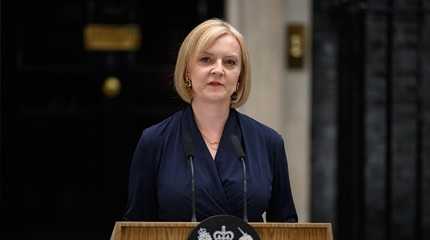
LONDON, Sept. 7 (Xinhua) -- British Prime Minister Liz Truss said on Wednesday that she hopes to find a "negotiated solution" to the row between Britain and the European Union (EU) over post-Brexit trade in Northern Ireland.
"My preference is for a negotiated solution, but it has to deliver all of the things we set out in the Northern Ireland protocol bill, what we cannot allow is this situation to drift," said Truss in her first Prime Minister's Questions (PMQs) session in the House of Commons since taking over from Boris Johnson as the country's leader.
A dispute over the Northern Ireland Protocol -- the rules governing post-Brexit trading arrangements for Northern Ireland -- has strained Britain's relations with the EU, stoking worries of a trade war if Truss presses ahead with her controversial bill to rewrite the protocol.
The Northern Ireland Protocol is a trade solution agreed by London and Brussels to prevent a hard border between Northern Ireland and the neighboring Republic of Ireland following Brexit.
Under the protocol, Northern Ireland is part of British customs territory but is subject to the EU's customs code, value-added tax (VAT) rules and single market rules for goods. However, a de facto Irish Sea border was thus created between the British mainland and Northern Ireland, meaning goods transported to and from Northern Ireland are subject to border controls.
Northern Ireland's pro-Brexit Democratic Unionist Party has demanded the removal or replacement of the protocol as a precondition for it to sit in the assembly and form a devolved government.
"I want to work with all of the parties in Northern Ireland to get the executive and assembly back up and running," Truss told the parliament.
"But in order to do that, we do need to fix the issues of the Northern Ireland protocol which has damaged the balance between the communities in Northern Ireland. I am determined to get on in doing that."
During the PMQs, Truss also confirmed that her government will make an announcement on how to deal with rising energy bills on Thursday.
Truss is reportedly planning to freeze energy bills for households and businesses at 2,500 pounds (2,857 U.S. dollars) a year to help the country tide over the worsening cost-of-living crisis. This is much lower than the energy price cap of 3,549 pounds set for October by the country's energy regulator Ofgem in late August. Her scheme is estimated to cost around 130 billion pounds.
Responding to the question of whether this would be funded by a windfall tax on energy companies' profits, Truss said that she is against a windfall tax.
"I believe it is the wrong thing to be putting companies off investing in the United Kingdom, just when we need to be growing the economy," she said. "This country will not be able to tax its way to growth."




